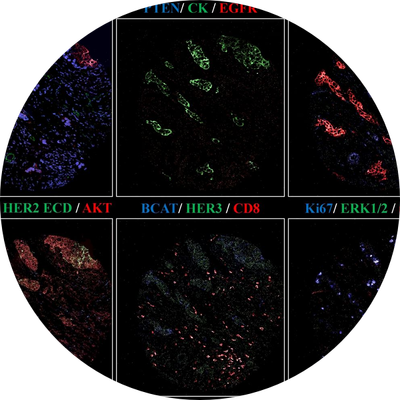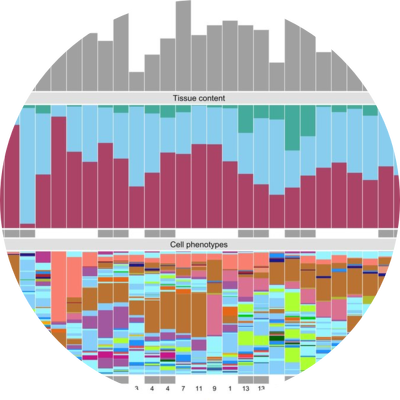Stratification
Stratifying subjects using Imaging Mass Cytometry
Stratifying subject populations is an important first step to improve clinical outcomes. However, complex single-cell phenotypes and the spatial heterogeneity of tissue architecture in the tumor microenvironment are not currently used to inform patient-specific health care decisions. Learn about pioneering researchers who have utilized Imaging Mass Cytometry™ (IMC™) for detailed analysis of variation of cellular signatures in cohort samples to answer clinical research questions, and who propose the future use of IMC in precision medicine and clinical decision making.

 |
 |
|
|
Hartland Jackson, PhD |
Jana Fischer, MSc |
First study to demonstrate the potential clinical value of highly multiplexed Imaging Mass Cytometry
See an initial example of the use of high-dimensional data from IMC to assess novel breast cancer subtypes that are associated with clinical outcome in an early 2020 Jackson et al. Nature publication, “The single-cell pathology landscape of breast cancer.” Co-senior authors Hartland Jackson, PhD, and Jana Fischer, MSc, describe the analysis of the cellular composition and tissue organization that provided a view of intra-tumor phenotypic heterogeneity in a disease-relevant manner, with the potential to inform patient-specific diagnosis. This press release also describes how this retrospective clinical study used IMC to correlate novel cell signatures with distinct clinical outcomes.

Distinct combinations of cell phenotypes associated with genomic subtypes of breast cancer
IMC was coupled with multiplatform genomics to perform a systematic analysis of single-cell phenotypic and spatial correlates of genomic alterations in cancer. In “Imaging Mass Cytometry and multiplatform genomics define the phenogenomic landscape of breast cancer,” a team of researchers investigated the structure of breast tumor ecosystems to better understand the phenotypic impact of genomic alterations. They identified characteristic tumor ecosystems that they believe can potentially be used to stratify patients and serve as targets for development of novel therapies in the future.

Identification of breast cancer tumors less likely to benefit from trastuzumab
Work guided by Rimm and Kluger at Yale School of Medicine resulted in a 2019 Clinical Cancer Research publication by Carvajal-Hausdorf et al. This research is one of the first examples of using IMC to assess structural and signaling proteins in a cohort of subjects treated with trastuzumab to discover associations with treatment benefits. In “Multiplexed (18-plex) measurement of signaling targets and cytotoxic T cells in trastuzumab-treated patients using Imaging Mass Cytometry,” the authors present evidence for the role of the immune system in trastuzumab mechanism of action, validate the IMC approach and demonstrate important translational relevance of results.
Bernd Bodenmiller, PhD

Bernd Bodenmiller on revealing new insights into tumors with Imaging Mass Cytometry
Yongpan Yan, PhD

An approach that combines molecular biology, immunology and cell biology tools to uniquely
Corinne Ramos, PhD, MBA

Advancing drug development with molecular imaging
For Research Use Only. Not for use in diagnostic procedures. Patent and License Information: www.standardbio.com/legal/notices. Trademarks: www.standardbio.com/legal/trademarks. Any other trademarks are the sole property of their respective owners. ©2025 Standard BioTools Inc. All rights reserved.
